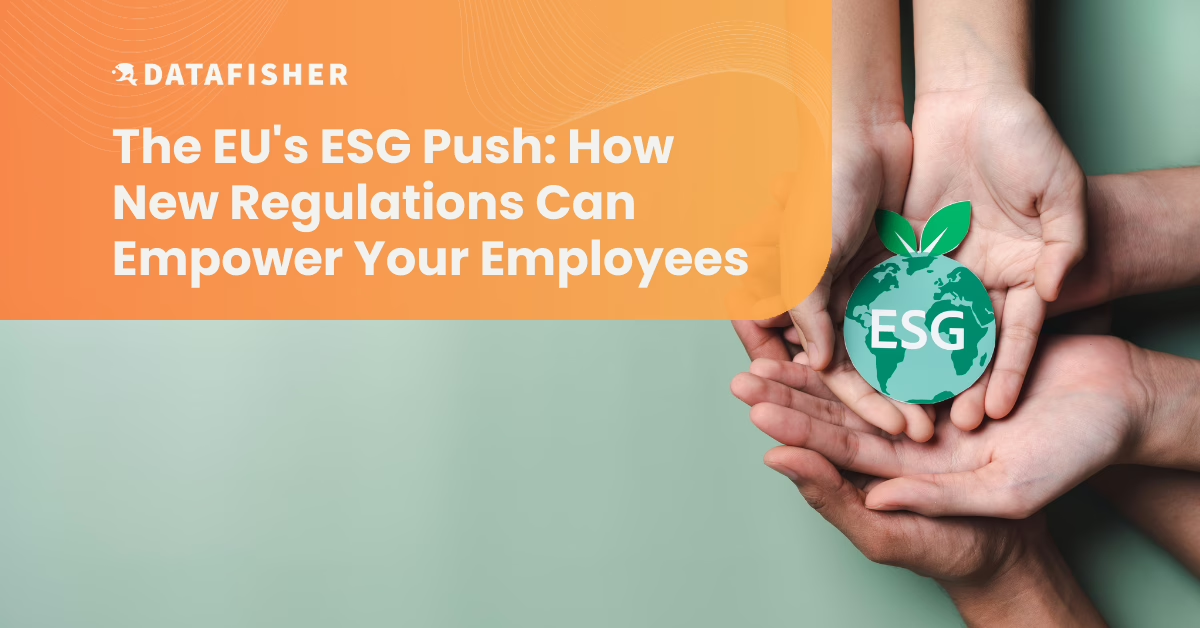The European Union (EU) is a leader in Environmental, Social, and Governance (ESG) initiatives. Their recent regulations, particularly the Corporate Sustainability Reporting Directive (CSRD), are shaking things up for companies with a presence in the EU. But what does this mean for your employees? While the focus might seem to be on reporting, the impact of these regulations can be surprisingly positive for your workforce.
Transparency Creates Trust: A New Era of Openness
The CSRD mandates increased transparency on a company’s social impact, including diversity, employee well-being, and respect for human rights. This translates to a more open dialogue between employers and employees. Here’s how it can benefit your workforce:
- Employee Recognition: New reporting on diversity and equal opportunity practices. This focus on inclusivity can empower underrepresented groups within your company. Employees will see their contributions valued and reflected in official reports.
- Focus on Well-being: The reports must also address working conditions and employee well-being. This can lead to companies prioritizing mental health initiatives, flexible work arrangements, and a healthier work environment. Employees will feel their well-being is a genuine concern, not just an afterthought.
- Empowering Through Engagement: Emphasizes stakeholder engagement, which includes employees. Companies might involve employees in discussions about sustainability goals and initiatives. This fosters a sense of ownership and purpose among employees, who can see their ideas contribute to a larger positive impact.
Sustainability in Action: Walking the Walk
The CSRD isn’t just about reports; it pushes companies to actively improve their social and environmental impact. This translates to real changes in the workplace that benefit employees:
- A Greener Workplace: Focuses on resource efficiency and reducing the environmental footprint. Companies might invest in energy-saving technologies, eco-friendly practices, and sustainable commuting options. This creates a healthier work environment and fosters a sense of shared responsibility for the planet.
- Supply Chain Responsibility: Mandates reporting on responsible sourcing practices throughout the supply chain. Companies might re-evaluate their supplier relationships, prioritizing ethical labor practices and environmental consciousness. Employees can feel proud to be part of an organization that upholds high ethical standards.
- Investment in Skills Development: The transition to a more sustainable business model often requires new skills and knowledge. Companies might invest in training programs focused on sustainability practices and green technologies. This can benefit employees by opening up new career paths and development opportunities.
Challenges and Opportunities: Adapting to the New Landscape
While the overall impact of the CSRD is positive, there can be initial challenges. Here’s how to turn them into opportunities:
- Data Collection and Reporting: Collecting and analyzing data for the CSRD reports can be a new burden for HR departments. However, it’s also a chance to improve data collection practices and gain deeper insights into your workforce.
- Employee Training and Communication: Employees might not understand the CSRD or its implications. Clear communication about the regulations and their goals can alleviate confusion and generate excitement about the company’s commitment to sustainability.
- Shifting Priorities: Implementing sustainable practices might require changes in day-to-day operations. This presents an opportunity to involve employees in brainstorming solutions and finding innovative ways to achieve sustainability goals without compromising efficiency.
The Road Ahead: A Sustainable Future for All
The EU’s ESG regulations are more than just reporting requirements. They represent a commitment to a more sustainable future, not just for the environment but also for society as a whole. By embracing these regulations, companies can create a more transparent, inclusive, and environmentally conscious workplace, one that empowers employees and fosters a sense of shared purpose. In the end, a company’s success hinges on its workforce. By prioritizing ESG practices, companies can not only meet regulatory requirements but also attract and retain top talent who share their values and desire to contribute to a better future.
Contact us at Datafisher to learn more about how we can assist with training your employees on the new CSRD regulations.
